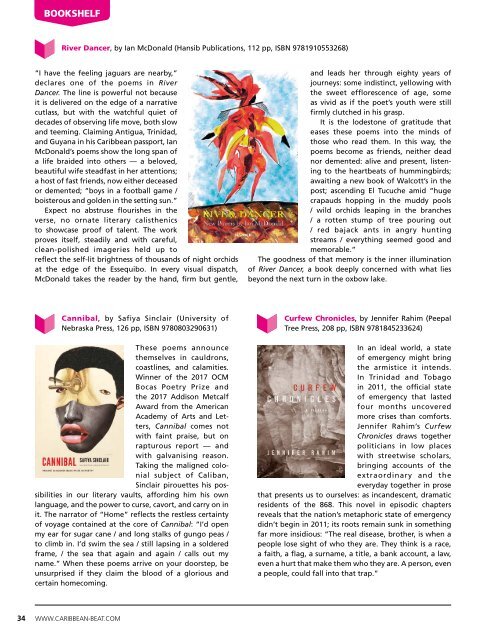Caribbean Beat — July/August 2017 (#146)
A calendar of events; music, film, and book reviews; travel features; people profiles, and much more.
A calendar of events; music, film, and book reviews; travel features; people profiles, and much more.
Create successful ePaper yourself
Turn your PDF publications into a flip-book with our unique Google optimized e-Paper software.
Bookshelf<br />
River Dancer, by Ian McDonald (Hansib Publications, 112 pp, ISBN 9781910553268)<br />
“I have the feeling jaguars are nearby,”<br />
declares one of the poems in River<br />
Dancer. The line is powerful not because<br />
it is delivered on the edge of a narrative<br />
cutlass, but with the watchful quiet of<br />
decades of observing life move, both slow<br />
and teeming. Claiming Antigua, Trinidad,<br />
and Guyana in his <strong>Caribbean</strong> passport, Ian<br />
McDonald’s poems show the long span of<br />
a life braided into others <strong>—</strong> a beloved,<br />
beautiful wife steadfast in her attentions;<br />
a host of fast friends, now either deceased<br />
or demented; “boys in a football game /<br />
boisterous and golden in the setting sun.”<br />
Expect no abstruse flourishes in the<br />
verse, no ornate literary calisthenics<br />
to showcase proof of talent. The work<br />
proves itself, steadily and with careful,<br />
clean-polished imageries held up to<br />
reflect the self-lit brightness of thousands of night orchids<br />
at the edge of the Essequibo. In every visual dispatch,<br />
McDonald takes the reader by the hand, firm but gentle,<br />
and leads her through eighty years of<br />
journeys: some indistinct, yellowing with<br />
the sweet efflorescence of age, some<br />
as vivid as if the poet’s youth were still<br />
firmly clutched in his grasp.<br />
It is the lodestone of gratitude that<br />
eases these poems into the minds of<br />
those who read them. In this way, the<br />
poems become as friends, neither dead<br />
nor demented: alive and present, listening<br />
to the heartbeats of hummingbirds;<br />
awaiting a new book of Walcott’s in the<br />
post; ascending El Tucuche amid “huge<br />
crapauds hopping in the muddy pools<br />
/ wild orchids leaping in the branches<br />
/ a rotten stump of tree pouring out<br />
/ red bajack ants in angry hunting<br />
streams / everything seemed good and<br />
memorable.”<br />
The goodness of that memory is the inner illumination<br />
of River Dancer, a book deeply concerned with what lies<br />
beyond the next turn in the oxbow lake.<br />
Cannibal, by Safiya Sinclair (University of<br />
Nebraska Press, 126 pp, ISBN 9780803290631)<br />
These poems announce<br />
themselves in cauldrons,<br />
coastlines, and calamities.<br />
Winner of the <strong>2017</strong> OCM<br />
Bocas Poetry Prize and<br />
the <strong>2017</strong> Addison Metcalf<br />
Award from the American<br />
Academy of Arts and Letters,<br />
Cannibal comes not<br />
with faint praise, but on<br />
rapturous report <strong>—</strong> and<br />
with galvanising reason.<br />
Taking the maligned colonial<br />
subject of Caliban,<br />
Sinclair pirouettes his possibilities<br />
in our literary vaults, affording him his own<br />
language, and the power to curse, cavort, and carry on in<br />
it. The narrator of “Home” reflects the restless certainty<br />
of voyage contained at the core of Cannibal: “I’d open<br />
my ear for sugar cane / and long stalks of gungo peas /<br />
to climb in. I’d swim the sea / still lapsing in a soldered<br />
frame, / the sea that again and again / calls out my<br />
name.” When these poems arrive on your doorstep, be<br />
unsurprised if they claim the blood of a glorious and<br />
certain homecoming.<br />
Curfew Chronicles, by Jennifer Rahim (Peepal<br />
Tree Press, 208 pp, ISBN 9781845233624)<br />
In an ideal world, a state<br />
of emergency might bring<br />
the armistice it intends.<br />
In Trinidad and Tobago<br />
in 2011, the official state<br />
of emergency that lasted<br />
four months uncovered<br />
more crises than comforts.<br />
Jennifer Rahim’s Curfew<br />
Chronicles draws together<br />
politicians in low places<br />
with streetwise scholars,<br />
bringing accounts of the<br />
extraordinary and the<br />
everyday together in prose<br />
that presents us to ourselves: as incandescent, dramatic<br />
residents of the 868. This novel in episodic chapters<br />
reveals that the nation’s metaphoric state of emergency<br />
didn’t begin in 2011; its roots remain sunk in something<br />
far more insidious: “The real disease, brother, is when a<br />
people lose sight of who they are. They think is a race,<br />
a faith, a flag, a surname, a title, a bank account, a law,<br />
even a hurt that make them who they are. A person, even<br />
a people, could fall into that trap.”<br />
34 WWW.CARIBBEAN-BEAT.COM


















